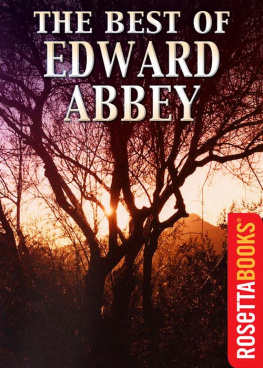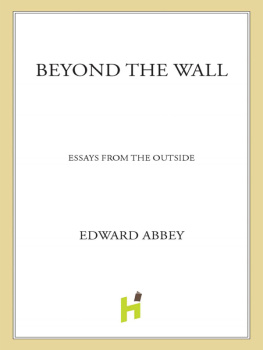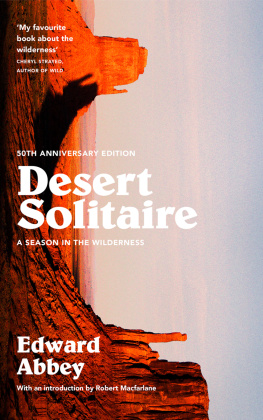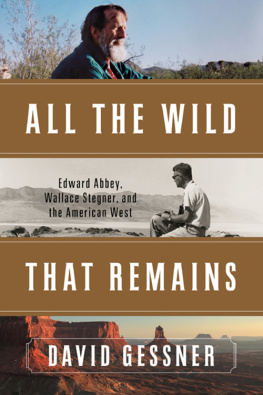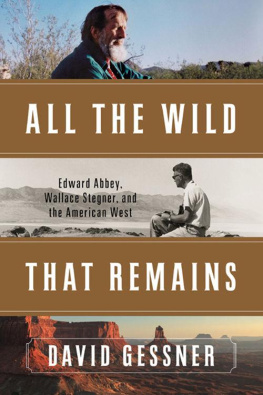The Best of Edward Abbey
Edward Abbey
The Best of Edward Abbey
Edited by Edward Abbey
with his own illustrations
Copyright
The Best of Edward Abbey
Copyright 1984 by Edward Abbey
Cover art to the electronic edition copyright 2011 by RosettaBooks, LLC
All rights reserved. No part of this book may be used or reproduced in any manner whatsoever without written permission except in the case of brief quotations embodied in critical articles and reviews.
Electronic edition published 2011 by RosettaBooks LLC, New York.
ISBN e-Pub edition: 9780795317453
ACKNOWLEDGMENTS
Acknowledgments for previously published material included in the first edition:
The selection from Jonathan Troy first appeared in Jonathan Troy, Dodd, Mead, 1954.
The selection from The Brave Cowboy first appeared in The Brave Cowboy, Dodd, Mead, 1956.
The selection from Fire on the Mountain first appeared in Fire on the Mountain, Dial Press, 1962.
The selection from Black Sun first appeared in Black Sun, Simon & Schuster, 1971.
The selection from The Monkey Wrench Gang first appeared in The Monkey Wrench Gang, Avon Books, 1976.
The selection from Good News first appeared in Good News, E. P. Dutton, Inc., 1980.
Cowboys, The Moon-Eyed Horse, Havasu, The Dead Man at Grandview Point, and Bedrock and Paradox first appeared in Desert Solitaire, McGraw-Hill, 1968.
The Great American Desert, Death Valley, Manhattan Twilight, Hoboken Night, and Telluride BluesA Hatchet Job first appeared in The Journey Home, E. P. Dutton, Inc., 1977.
Anna Creek, The Outback, A Desert Isle, Sierra Madre, Down There in the Rocks, Science with a Human Face, In Defense of the Redneck, Fire Lookout, and The Sorrows of Travel first appeared in Abbeys Road, E. P. Dutton, Inc., 1979.
Down the River with Henry Thoreau, Watching the Birds: The Windhover, Of Protest, My Friend Debris, and Floating first appeared in Down the River, E. P. Dutton, Inc., 1982.
Selection from Appalachian Wilderness first appeared in Appalachian Wilderness, E. P. Dutton, Inc., 1973.
The publisher gratefully acknowledges permission to reprint additional selections from the following copyrighted sources:
Bonnies Return from Hay duke Lives! by Edward Abbey. Copyright 1989 by The Estate of Edward Abbey. By permission of Little, Brown and Company, Inc.
Down to the Sea of Cortez in Beyond the Wall: Essays from the Outside by Edward Abbey. Copyright 1971, 1976, 1977, 1979, 1984, by Edward Abbey. Reprinted by permission of Henry Holt and Company, LLC.
Pages 437 to 440 in The Fools Progress: An Honest Novel by Edward Abbey. Copyright 1988, 1990 by Edward Abbey. Reprinted by permission of Henry Holt and Company, LLC.
Three poems from Earth Apples: Collected Poems by Edward Abbey. Copyright 1994 by Clarke C. Abbey. Excerpts from Confessions of a Barbarian: Selections from the Journals of Edward Abbey. Copyright 1994 by Clarke Abbey. Reprinted by permission of Clarke Abbey and Don Congdon Associates, Inc.
Contents
The Authors Preface
to His Own Book
T he Reader as literary object has two useful functions: it can serve as a convenient one-volume introduction to a writers work for those not previously acquainted with it, leading to deeper intimacies; or the Reader may suffice to confirm ones doubts and suspended contempt, thus sparing the critic the bother of looking further. I trust that my book will satisfy the expectations of both types of Reader readers.
In compiling this one-man show I have endeavored, as an author naturally does, to present what I think is both the best and the most representative of my writingso far. The emphasis falls on the latter term. Most of my writing has been in the field of the novel, explorations in certain aspects of the human comedy, especially the traditional conflict between our instinctive urge toward fraternity, community, and freedom, and the opposing demands of discipline and the state. The human versus human institutionsa conflict as old as the development of agriculture, urbanism, militarism, and hierarchy. That theme, like a scarlet thread, runs through everything I have written, binding it together into whatever unity it may have. Seeking to develop this theme in dramatic form, the best and most deeply felt of my writing flows toward fiction, toward the creation of symbolic structures, the telling and retelling (always trying to get it right) of one of our oldest stories.
Excerpts from novels, however, make poor material for an anthology. At least in the kind of fiction I have been writing, few of my excerpts or chapters make much sense in isolation; none have the independent coherence of a good short story. Nevertheless, I chose to insert in this Reader one episode from each of my novels, not to please or amuse, but in hope of tickling enough interest to lure the potential reader into the ambuscade of the originals. But these episodes are brief and there are only seven of them.
The bulk of the book consists of chapters from four collections of informal, personal (sometimes highly personal) accounts of travel, ideas, people, nature, places, adventuresDesert Solitaire, The Journey Home, Abbeys Road, and Down the River. I like to call such writing personal history. Most of the selections qualify, I think, as essays, another adequately vast, vague, and self-defining label. We know that in this world there are actually only two kinds of books: (1) good books, and (2) the others. But books require finer labels so that librarians, in a culture built on the babble of numbers and words, may not go clinically insane.
My first book (Troy) was published in 1954. According to the calendar on the wall, I am writing these words in the year 1984. Thirty years in the book-writing businessappalling! For so prolonged an effort my output has been small, about a dozen volumes worthy of the title book plus the texts for four or five scenic-photography coffee-table compendiums, which I do not count as legitimate books and which in any case nobody reads. (One of those things, if you attached legs to it, would do as a coffee-table in itself.) Of the eleven or twelve legitimate books only one, The Monkey Wrench Gang, goes beyond 300 pages. Hardly enough to gain my union card.
Where have the years gone? Why, into the usual vices of the romantic realist: into sloth and melancholy, each feeding upon and reinforcing the other, into love and marriage and the begetting of children, into the strenuous maneuvers of earning a living without living to earn, into travel and play and music and drink and talk and laughter, into saving the worldbut saving the world was only a hobby. Into watching cloud formations float across our planetary skies. But mostly into sloth and melancholy and I dont regret a moment of it.
If I had stayed in Hoboken when I had the chance, holed up in the urban hive while acid rain pattered on the roof and drug-crazed killers stalked the alleyways, I would now be the Dostoyevsky of Hudson County, New Jersey. Two of my American heroes are Nelson Algren and Dr. William Carlos Williams. But I left after one year.
Nothing can be more fatuous than a writer writing about his own writing and the serious reader is advised to skip what follows; I intend to go on probing this same vein for several pages more. It may be of interest to other essayists and novelists. I know that

